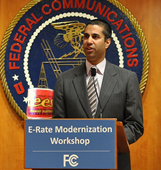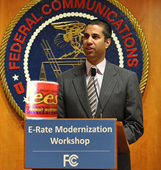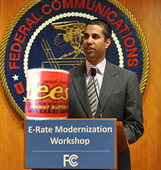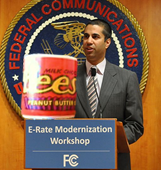(Warning: Author is clearly biased.)
November 22, 2017.
Pai has very little interest in upholding the integrity of the legally required public commenting process, even though there’s plenty of evidence of foul play.

November 30, 2017.
Ajit Pai compares all regulation with authoritarianism.

December 6, 2017.
Ajit Pai “argues” that killing net neutrality helps the sick and disabled.

January 18, 2018.
Ajit Pai “argues” that net neutrality slowed down deployment of both mobile/fixed broadband internet, even though many ISPs boast the opposite.

A history of lying
The trustworthiness of telecoms giants can at the very best be characterised as questionable. As an example Comcast recently fired many employees after saying that tax cuts would generate thousands of jobs. AT & T has done a similar thing. It also seems unlikely that net neutrality repeal and tax benefits will at all go towards network upgrades or the employees, but rather benefit the bottom lines of the telecoms giants. This is nothing new. A simple Google search (or a Bing search, if you’re so inclined) will show a history of insidious business practices and “funny” ways to handle the truth.
Bots/fake voters were used in overwhelming numbers to subvert popular opinion. You’d think that, if the argument against net neutrality had any kind of substance other than being a money grab, fraud of this magnitude wouldn’t be necessary.
Hope
Due to the real public opinion on net neutrality, there is speculation that this might boomerang on its proponents and have an impact on their future political careers.
The people even republican voters, seem overwhelmingly against the repeal of net neutrality.
An app to help [test speed and expose throttling] has been released for both Android and iOS( https://arstechnica.com/tech-policy/2018/01/the-net-neutrality-testing-app-that-apple-rejected-is-available-now/).
The fight against the repeal continues in court.
Why is this important to me as a non-US citizen
It could set a precedent for greed that is followed elsewhere in the world, would stifle growth, hurt poor people and make the web even less democratic. Having completely unregulated ISPs is like having the wolves watching the sheep.
It also has the potential to hurt services that are global, useful, but based in the US by reducing the connection speed when using these service in order to replace them with their own inferior services. This could both hurt big players like Netflix, but it could also stifle creativity, by making the world uncertain for upstarts by creating an uneven and unpredictable playing field where the telecom giants pick the winners and losers. This has already happened with the Verizon, AT & T and T-Mobiles ISIS-wallet which was a poor product that was provided by carriers on Android devices, where especially Verizon made the usage of alternative Google Wallet almost impossible.
(NOT SO) FUN FACT: Ajit Pai used to work for Verizon, before joining the public sector.